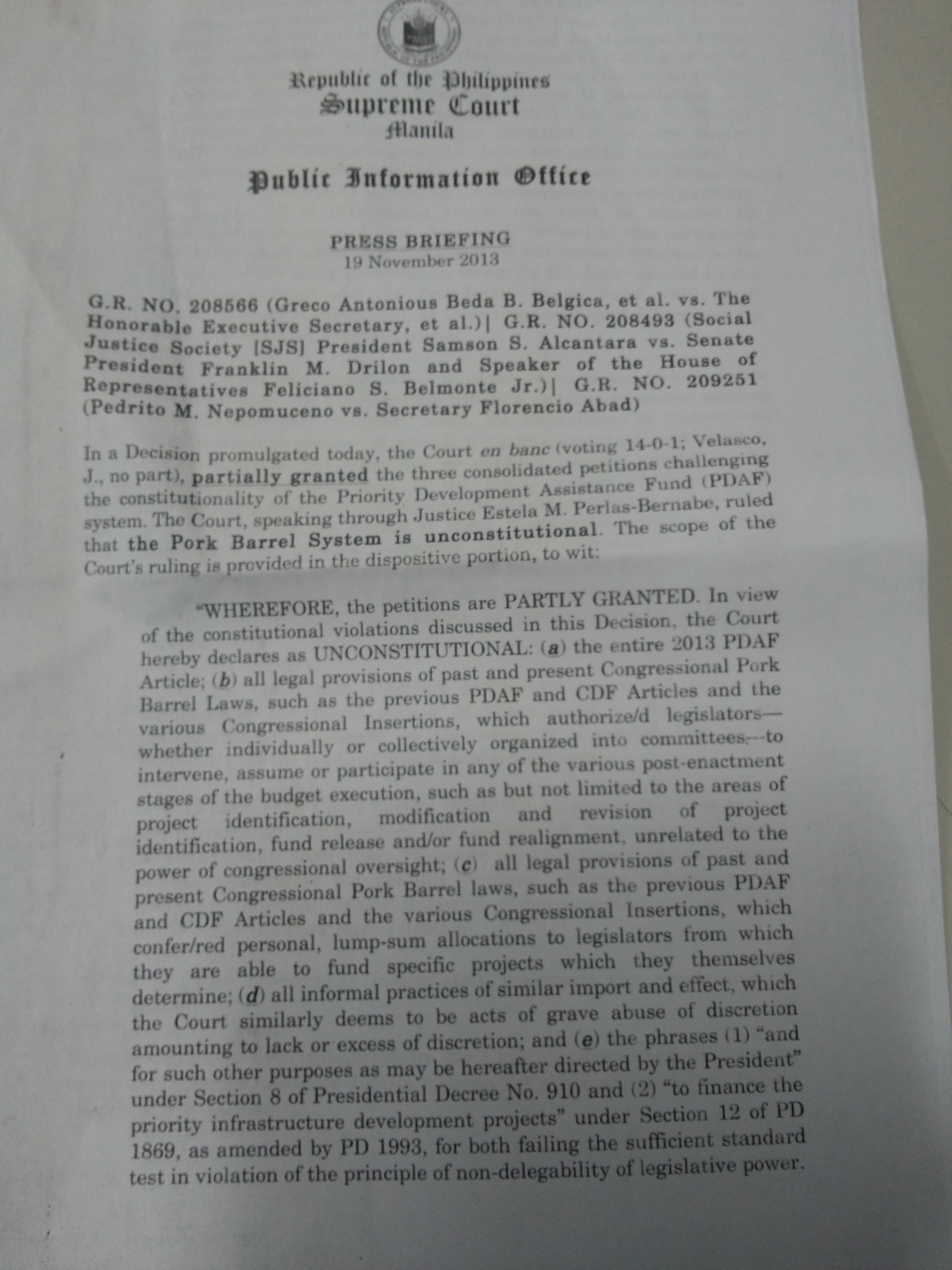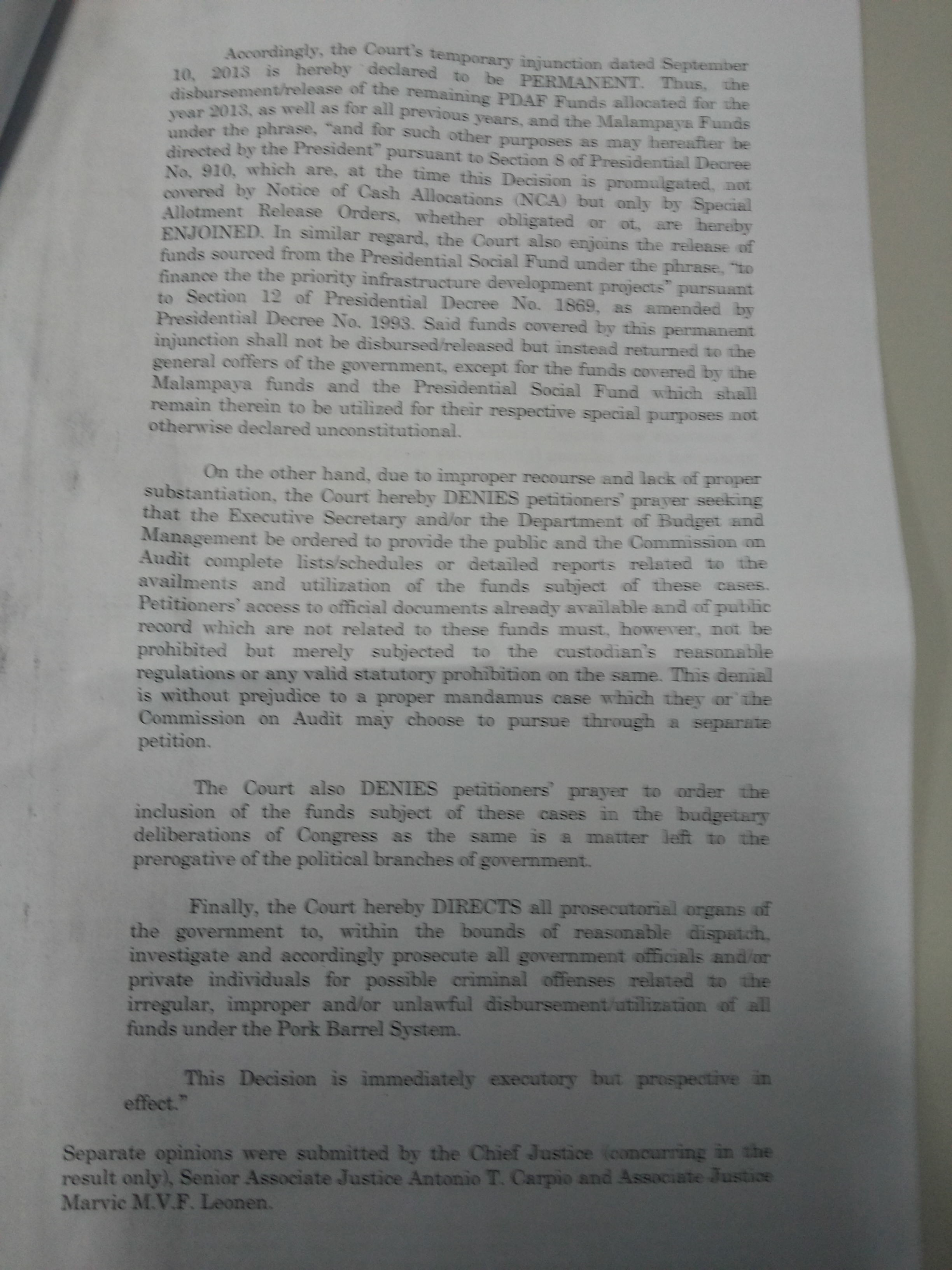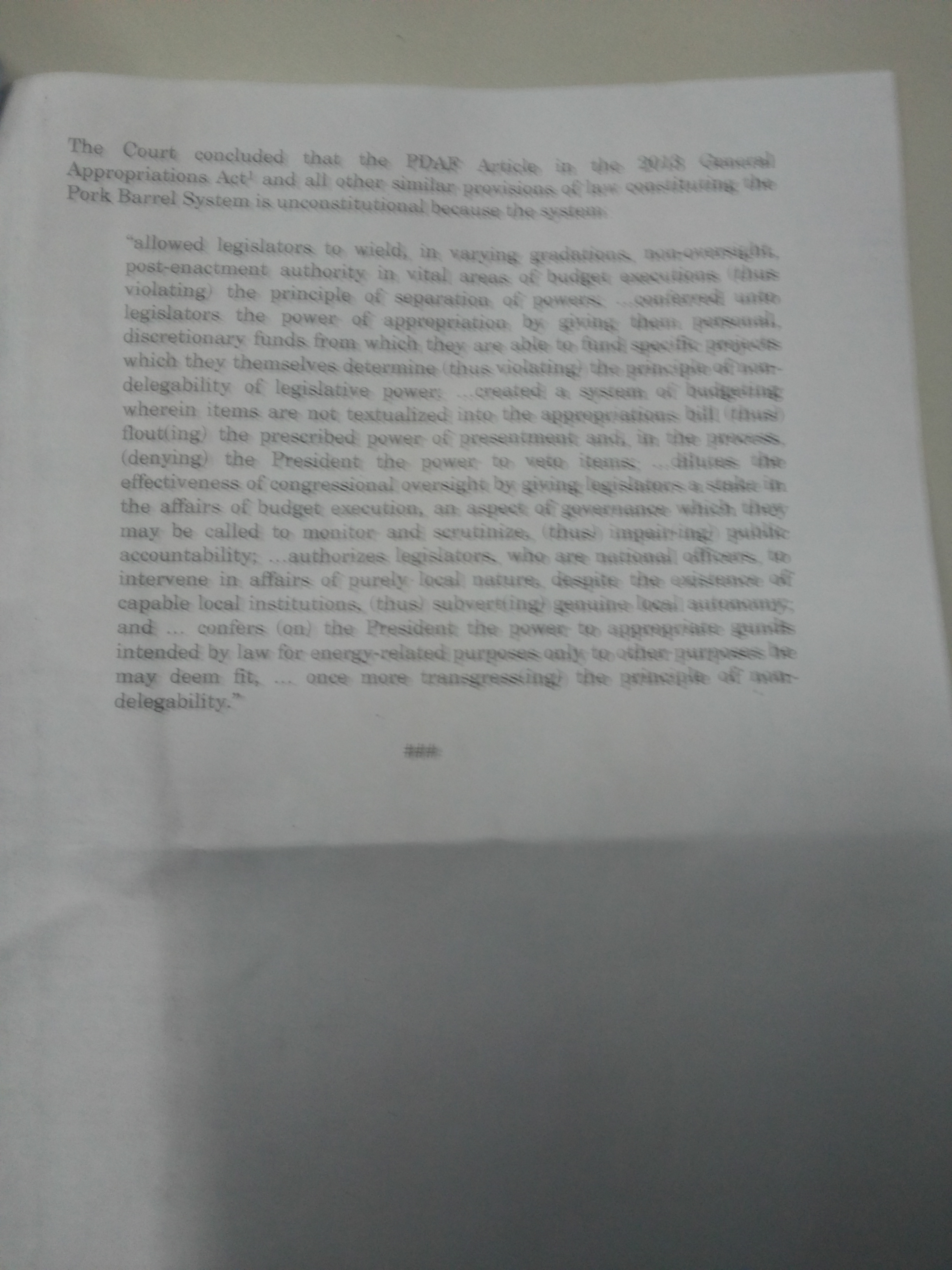In the decision authored by Associate Justice Estela Perlas Bernabe, the high court declared as unconstitutional the entire 2013 PDAF.
The high court also nullifies “all legal provisions of past and present Congressional Pork Barrel laws, such as the previous PDAF and Countrywide Development Fund (CDF) articles and the various Congressional Insertions, which authorize/d legislators-whether individually or collectively organized into committees—to intervene, assume or participate in any of the various post-enactment stages of the budget execution.”
At the same time, the high court also nullified the laws that provided lawmakers lump-sum allocations to fund their chosen projects.
“All informal practices of similar import and effect, which the Court similarly deems to be acts of grave abuse of discretion amounting to lack or excess of discretion,” are also declared void.
“Accordingly the Court’s temporary injunction dated Sept. 10, 2013 is hereby declared to be permanent. Thus, the disbursement/release of the remaining PDAF funds allocated for the year 2013, as well as for all previous years…are hereby enjoined,” the high court said.
The high court ordered the Department of Justice and the Office of the Ombudsman to investigate and file the needed cases against all government officials as well as private individuals involved in the improper disbursement of PDAF.
Among those who separately petitioned the court to scrap the PDAF system are losing senatorial candidates Samson Alcantara and Greco Belgica.
Petitioners pointed out that the system on discretionary funds of both Congress and Malacañang violated the constitutional limits given to the executive and the legislative because they were able to spend money beyond what was approved by Congress “since these are lump sum funds.”
On the other hand, the government through the Office of the Solicitor General said the high court has upheld the constitutionality of the PDAF system in previous cases, including LAMP vs. DBM.
Below is a copy of the Supreme Court ruling:



Full copy of the Supreme Court Decision by Manila Bulletin
In view of the constitutional violations discussed in this Decision, the Court hereby declares as UNCONSTITUTIONAL: (a) the entire 2013 PDAF Article; (b) all legal provisions of past and present Congressional Pork Barrel Laws, such as the previous PDAF and CDF Articles and the various Congressional Insertions, which authorize/d legislators—whether individually or collectively organized into committees—to intervene, assume or participate in any of the various post-enactment stages of the budget execution, such as but not limited to the areas of project identification, modification and revision of project identification, fund release and/or fund realignment, unrelated to the power of congressional oversight; (c) all legal provisions of past and present Congressional Pork Barrel laws, such as the previous PDAF and CDF Articles and the various Congressional Insertions, which confer/red personal, lump-sum allocations to legislators from which they are able to fund specific projects which they themselves determine; (d) all informal practices of similar import and effect, which the Court similarly deems to be acts of grave abuse of discretion amounting to lack or excess of discretion; and (e) the phrases (1) “and for such other purposes as may be hereafter directed by the President” under Section 8 of Presidential Decree No. 910 and (2) “to finance the priority infrastructure development projects” under Section 12 of PD 1869, as amended by PD 1993, for both failing the sufficient standard test in violation of the principle of non-delegability of legislative power.”
“WHEREFORE, the petitions are PARTLY GRANTED. In view of the constitutional violations discussed in this Decision, the Court hereby declares as UNCONSTITUTIONAL: (a) the entire 2013 PDAF Article; (b) all legal provisions of past and present Congressional Pork Barrel Laws, such as the previous PDAF and CDF Articles and the various Congressional Insertions, which authorize/d legislators—whether individually or collectively organized into committees—to intervene, assume or participate in any of the various post-enactment stages of the budget execution, such as but not limited to the areas of project identification, modification and revision of project identification, fund release and/or fund realignment, unrelated to the power of congressional oversight; (c) all legal provisions of past and present Congressional Pork Barrel laws, such as the previous PDAF and CDF Articles and the various Congressional Insertions, which confer/red personal, lump-sum allocations to legislators from which they are able to fund specific projects which they themselves determine; (d) all informal practices of similar import and effect, which the Court similarly deems to be acts of grave abuse of discretion amounting to lack or excess of discretion; and (e) the phrases (1) “and for such other purposes as may be hereafter directed by the President” under Section 8 of Presidential Decree No. 910 and (2) “to finance the priority infrastructure development projects” under Section 12 of PD 1869, as amended by PD 1993, for both failing the sufficient standard test in violation of the principle of non-delegability of legislative power.
Accordingly, the Court’s temporary injunction dated September 10, 2013 is hereby declared to be PERMANENT. Thus, the disbursement/release of the remaining PDAF Funds allocated for the year 2013, as well as for all previous years, and the Malampaya Funds under the phrase, “and for such other purposes as may hereafter be directed by the President” pursuant to Section 8 of Presidential Decree No, 910, which are, at the time this Decision is promulgated, not covered by Notice of Cash Allocations (NCA) but only by Special Allotment Release Orders, whether obligated or ot, are hereby ENJOINED. In similar regard, the Court also enjoins the release of funds sourced from the Presidential Social Fund under the phrase, “to finance the the priority infrastructure development projects” pursuant to Section 12 of Presidential Decree No. 1869, as amended by Presidential Decree No. 1993. Said funds covered by this permanent injunction shall not be disbursed/released but instead returned to the general coffers of the government, except for the funds covered by the Malampaya funds and the Presidential Social Fund which shall remain therein to be utilized for their respective special purposes not otherwise declared unconstitutional.
On the other hand, due to improper recourse and lack of proper substantiation, the Court hereby DENIES petitioners’ prayer seeking that the Executive Secretary and/or the Department of Budget and Management be ordered to provide the public and the Commission on Audit complete lists/schedules or detailed reports related to the availments and utilization of the funds subject of these cases. Petitioners’ access to official documents already available and of public record which are not related to these funds must, however, not be prohibited but merely subjected to the custodian’s reasonable regulations or any valid statutory prohibition on the same. This denial is without prejudice to a proper mandamus case which they or the Commission on Audit may choose to pursue through a separate petition.
The Court also DENIES petitioners’ prayer to order the inclusion of the funds subject of these cases in the budgetary deliberations of Congress as the same is a matter left to the prerogative of the political branches of government.
Finally, the Court hereby DIRECTS all prosecutorial organs of the government to, within the bounds of reasonable dispatch, investigate and accordingly prosecute all government officials and/or private individuals for possible criminal offenses related to the irregular, improper and/or unlawful disbursement/utilization of all funds under the Pork Barrel System.
This Decision is immediately executory but prospective in effect.”
11/19/13 - SC decision restores normal constitutional order
As early as 1994, the constitutionality of the pork barrel, then called the Countrywide Development Fund (CDF), was challenged on the ground of violation of the rule that, although appropriating money is the function of Congress, spending it is the prerogative of the executive branch.
The Supreme Court ruled in favor of the CDF. It said that what the law allowed members of Congress to do was simply to recommend projects. If the recommended projects qualified for funding under the CDF, it was the President who would implement them.
Prior to the approval of the 1994 General Appropriations Act (GAA), pork barrel, which was recognized by the 1935 Constitution as a legitimate institution, had not received much attention. In the years from 1972 to 1986, there was no talk about pork barrel. But those were unusual years because, for all practical purposes, President Ferdinand Marcos controlled the national treasury, both pork and beef.
After the restoration of democratic processes and in the years from 1986 to 1993, pork barrel was not a hot subject of debate. It was only after the approval of the 1994 GAA that pork barrel became a frequent front-page subject for heated discussion.
What was it in the 1994 GAA that invited debate?
Earlier pork barrel laws specifically stated that the money could be released only with the approval of the President, and that the budget secretary should promulgate rules and regulations for pork barrel funds. For as long as this was followed, there was no problem. However, such requirements were removed by the 1994 GAA, Republic Act No. 7663.
Officials concerned
RA 7663 simply said: “The fund shall be automatically released quarterly by way of Advice of Allotments and Notice of Cash Allocation directly to the assigned implementing agency not later than five (5) days after the beginning of each quarter upon submission of the list of projects and activities by the officials concerned.”
Who are these “officials concerned”? They are senators, representatives, and the Vice President. In effect, RA 7663 gave to the members of Congress control over the release of approved funds.
Whereas
under the Constitution it is the President, either directly or through
executive agencies, who should control the release of funds, the
executive agencies awaited the go-signal of the members of Congress
before they could release the funds for the projects recommended by the
members of Congress.
As the Constitution says, “No money shall be paid out of the Treasury except in pursuance of an appropriation made by law.” The appropriation can be either through the general appropriations law or through special appropriations. This provision prevents members of Congress, and the President, from indiscriminately spending unappropriated money.
Now that we have the Supreme Court decision, unappropriated and unspent money will have to be returned to the general coffers of government “except for the funds covered by the Malampaya Fund and the Presidential Social Fund, which shall remain therein to be utilized for their respective special purposes not otherwise declared unconstitutional.”
Effect on President
What effect will this decision have on President Aquino’s capacity to meet emergency situations? I do not know how much money the President has in the contingency provisions for him in the general appropriations law.
Does he have the resources needed to deal with the effects of the October earthquake in Bohol and now also with the ravages caused by Supertyphoon “Yolanda?” At the rate the President is reassuring the survivors of the ravages caused by nature, he probably is confident that he has the resources. If needed, he can call Congress to a special session to appropriate what more is required.
The beneficiaries of the pork barrel will probably be unhappy with the high court’s decision. Many of them really needed what the pork barrel system had given them. That need of many remains.
The challenge now is for Congress and for the President to devise something constitutional to fill the vacuum left by the Supreme Court’s decision declaring pork barrel unconstitutional.
11/19/13 - Statement by Senate President Franklin M. Drilon
on the Supreme Court's ruling on the PDAF
"We welcome the decision of the Supreme
Court declaring the Priority Development Assistance Fund (PDAF)
unconstitutional. We will abide by the decision of the Supreme Court."
"The highest court's decision is moot and
academic insofar as the Senate is concerned, as the senators have
already waived their use of the remaining PDAF for 2013. Also, a
majority of the senators, at least 15 of us, have already decided to
fully delete the PDAF in the 2014 budget, which in effect will lower the
country's budget deficit pegged at P266.2 billion."
"With this decision, we are now eyeing
the passage of a supplemental budget for 2013 - and we will thereafter
urge the President to certify it as urgent - in the amount of P14.5
billion representing the unutilized PDAF for 2013, which the executive
may use to bolster its relief operations and rehabilitation of areas
affected by the recent calamities, particularly typhoon Yolanda, Santi,
Labuyo, and as well as the siege in Zamboanga City and the 7.2 magnitude
earthquake in Visayas."
"I believe the SC decision reinforces the
government's efforts to reform the country's political system and
likewise affirms the Senate's position that PDAF must be abolished."
"Everybody is stepping in the right
direction, as the abolition of PDAF system should be the start of more
reforms aimed at curbing corruption and misuse of taxpayers' money."
"With the abolition of PDAF, we will also
dismantle the system of political patronage that has stunted
socio-economic development and allowed a few to maintain their political
dominance in certain areas."
"The Senate will see to it that
henceforth, all officials shall adhere to laws and rules and regulations
governing the use of public funds."
11/15/13 - SC sets rules on DAP hearing
Lawyers for the petitioners and Malacañang will be confined to argue on six issues when the Supreme Court holds the public hearing on the legality of the Disbursement Acceleration Program.
In an advisory released Thursday, the SC set two categories--procedural and substantive--the issues to be tackled on November 19.
On a technical level, the SC directed parties to resolve if there is a controversy ripe for judicial determination, if petitioners have legal standing to question DAP and whether certiorari, prohibition and mandamus are proper remedies to assail the constitutionality and validity of the DAP.
The substantive aspect covers whether or not the DAP violates Sec. 29, Art. VI of the constitution, mandating that “no money shall be paid out of the treasury except in pursuance of an appropriation made by law.”
The SC justices approved the guidelines in session last Tuesday.
The nine petitions against DAP were filed earlier by former Iloilo Rep. Augusto Syjuco, lawyers Jose Malvar Villegas Jr. and Manuelito Luna; Philippine Constitution Association; Integrated Bar of the Philippines; the militant Bayan Muna, Kabataan and Gabriela party-list groups; Christian sects led by losing senatorial candidate Greco Belgica; Confederation for Unity, Recognition and Advancement of Government Employees; and the Volunteers Against Crime and Corruption.
They alleged that the discretionary fund of the President violated the legislature’s power of the purse.
The respondents in the case--Office of the President, Department of Budget and Management and the Senate and House of Representatives--have asked the SC to dismiss all petitions for lack of merit.
Solicitor General Francis Jardeleza argued there was “no genuine question of law, only error in petitioners’ appreciation of the facts” and that critics could have just conducted “reasonable inquiry and reading of publicly available information.”
source: Manila Standard
10/31/13: Oral arguments on DAP to focus on six issues
PARTIES to the pending petitions on the Disbursement Acceleration Program (DAP) filed at the Supreme Court (SC) have proposed six issues to be discussed in the impending oral arguments on the controversial stimulus funds.
In a press briefer, the SC’s Public Information Office (PIO) said debates will include the real nature of the DAP, whether it is a fund or a program.
Oral arguments will also tackle the legal basis for the creation of the DAP, its constitutionality based on fund releases upon requests of lawmakers and the definition of “savings” under the Constitution and other rules. Lastly, the debates will cover the DAP’s legality as a program based on existing laws, the DAP funds’ constitutionality in augmenting the General Appropriations Act.
The SC has allotted 30 minutes for the petitioners and respondents. The time will not include justices’ interpellation of the speakers.
Petitioners will submit to the SC, through the assigned justice, their proposal on how to divide the time allotment as well as the order and identity of speakers.
Petitions challenging the DAP will be heard on oral arguments on Nov. 11 starting at 10 a.m.
“The argument will be on the merits of the petitions as well as the need to issue a stay order.”
The SC likewise ordered the solicitor general to comment on the consolidated petitions by Nov. 7.
A total of seven petitions are questioning the DAP’s constitutionality.
The latest petition was filed by losing senatorial candidate Greco Antonious Beda B. Belgica, Bishop Reuben M. Abante and Rev. Jojo L. Gonzales. -- Mikhail Franz E. Flores
source: Businessworld
